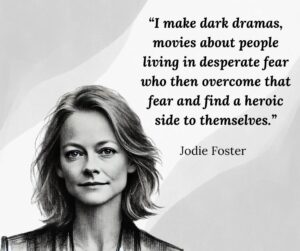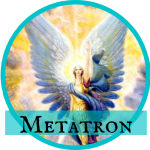Jodie Foster is an artist who has always defied convention, captivating audiences with her fearless choice of roles and the unapologetic honesty of her storytelling. She once described her approach to filmmaking, saying, “I make dark dramas, movies about people living in desperate fear who then overcome that fear and find a heroic side to themselves.” This statement not only encapsulates the essence of her cinematic vision but also reflects a profound understanding of the human condition.
Through her films, Foster invites us into the shadowy corners of the psyche, compelling us to confront the darkness within ourselves and recognize the heroism that can emerge from adversity. Let’s explore how her philosophy manifests in her work, why it resonates so deeply, and what it tells us about the power of storytelling in our lives.
The Allure of Darkness in Cinema
Dark dramas hold a mirror to the rawest parts of human existence: vulnerability, fear, and struggle. These films often explore themes that many would rather avoid—trauma, loss, and existential dread. Yet, Foster doesn’t present darkness as an endpoint. Instead, it serves as the crucible for transformation.
Take The Silence of the Lambs (1991), one of Foster's most iconic films. Her portrayal of Clarice Starling, a young FBI trainee tasked with facing the brilliant yet terrifying Hannibal Lecter, exemplifies her ability to navigate fear and strength. Starling is haunted by her childhood trauma and societal challenges, yet she refuses to succumb. Instead, her fear becomes the impetus for growth, sharpening her determination and moral compass.
For Foster, darkness is not a void but a canvas. It is a space where characters can wrestle with their fears, discover resilience, and ultimately transcend their limitations.
Fear as a Catalyst for Growth
Fear is universal. Whether it’s the fear of failure, rejection, or the unknown, it shapes our choices and often limits our potential. Foster’s work taps into this fundamental human experience, presenting characters who grapple with profound dread yet emerge stronger on the other side.
In Contact (1997), Foster plays Dr. Ellie Arroway, a scientist driven by an insatiable curiosity about the universe. While the story is rooted in science fiction, it’s also a deeply personal exploration of faith, loss, and the courage to face the unknown. Ellie’s journey is not just about seeking extraterrestrial life—it’s about confronting her inner fears, doubts, and the pain of losing her father.
Foster’s portrayal of Ellie underscores a recurring theme in her films: fear is not a weakness. Instead, it is a powerful force that, when confronted, can lead to self-discovery and transformation. Her characters often embody this philosophy, showing that true heroism lies not in the absence of fear but in the courage to face it.
Finding the Hero Within
One of the most compelling aspects of Foster’s films is their focus on ordinary people finding extraordinary strength. Her characters are rarely superheroes or larger-than-life figures. Instead, they are relatable individuals who discover their heroism through perseverance and self-belief.
In Panic Room (2002), Foster plays Meg Altman, a recently divorced mother who must protect her daughter during a home invasion. Trapped and terrified, Meg has no choice but to confront her worst fears. Her transformation from a vulnerable victim to a fierce protector illustrates the resilience of the human spirit.
Foster’s message is clear: heroism is not about grand gestures or innate abilities. It’s about the choices we make in moments of crisis. Her characters remind us that even in the face of overwhelming fear, we have the power to rise above our circumstances and reclaim our agency.
The Role of Empathy in Dark Dramas
What sets Foster apart as a storyteller is her deep empathy for her characters. She doesn’t just portray their struggles; she invites us to understand and connect with them on a human level. This empathy is crucial in dark dramas, where characters are often flawed, broken, or morally ambiguous.
Consider her directorial work in The Beaver (2011), a film about a man grappling with severe depression. While the premise—a man communicating through a hand puppet—might seem absurd on the surface, Foster’s direction imbues the story with authenticity and compassion. The film delves into the complexities of mental illness, showing the pain, resilience, and humanity of its characters.
By fostering empathy, Foster challenges audiences to look beyond surface judgments and see the humanity in even the darkest of circumstances. This approach not only deepens our connection to her stories but also encourages us to extend that empathy to others in our own lives.
Why Audiences Are Drawn to These Stories
Foster’s focus on fear and heroism resonates because it mirrors our own experiences. Life is filled with challenges that test our strength and push us to grow. By watching characters navigate these struggles on screen, we see reflections of ourselves and gain insight into our own journeys.
Her films also provide a sense of hope. In a world often fraught with uncertainty and despair, stories of triumph over fear remind us of our capacity for resilience. They show that even in the darkest moments, there is potential for light, growth, and redemption.
Moreover, Foster’s work challenges the conventional notion of heroism. It’s not about saving the world or achieving glory. It’s about facing our fears, embracing vulnerability, and finding strength in the face of adversity. This redefinition of heroism is both empowering and deeply human.
Jodie Foster’s Legacy
Jodie Foster’s impact on cinema goes beyond her performances or directorial achievements. Her commitment to telling stories that explore fear and heroism has left an indelible mark on the industry. She has redefined what it means to be a hero, showing that courage is not the absence of fear but the willingness to confront it.
Her work continues to inspire audiences and filmmakers alike, encouraging them to embrace vulnerability and seek transformation. Whether through her acting, directing, or producing, Foster remains a powerful voice in storytelling, reminding us of the strength we all carry within.
In Conclusion
Jodie Foster’s words, “I make dark dramas, movies about people living in desperate fear who then overcome that fear and find a heroic side to themselves,” encapsulate her artistic vision and the timeless appeal of her work. Through her films, she explores the complexities of fear and the resilience of the human spirit, offering stories that are both deeply personal and universally relatable.
In a world that often celebrates surface-level triumphs, Foster’s focus on inner heroism stands out as a profound reminder of what it truly means to be human. Her stories challenge us to confront our fears, embrace our vulnerabilities, and discover the hero within—a journey that, much like her films, is both challenging and deeply rewarding.


















